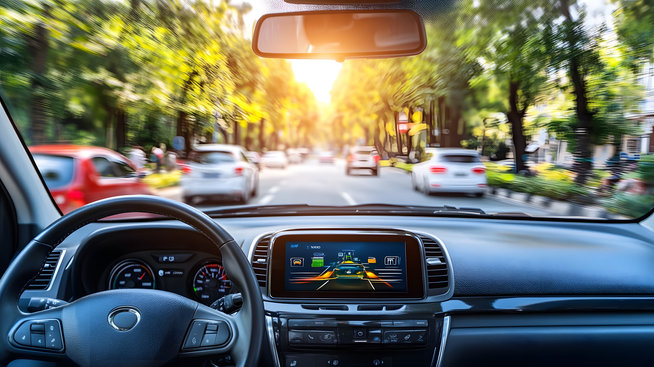Who is Liable in Self-Driving Car Accidents?
 Self-driving cars promise to revolutionize transportation, but when these vehicles cause accidents, determining liability becomes far more complex than traditional car crash cases. Unlike conventional accidents, where driver error is typically the primary factor, autonomous vehicle crashes may involve multiple parties, including manufacturers, software developers, and human operators.
Self-driving cars promise to revolutionize transportation, but when these vehicles cause accidents, determining liability becomes far more complex than traditional car crash cases. Unlike conventional accidents, where driver error is typically the primary factor, autonomous vehicle crashes may involve multiple parties, including manufacturers, software developers, and human operators.
At Mintz Law Firm, we stay current with emerging technologies and their legal implications. Our personal injury attorneys understand the unique challenges self-driving car accidents present and work to ensure victims receive fair compensation regardless of the complex liability questions these cases involve.
The Current State of Self-Driving Technology
Autonomous vehicles operate at different levels of automation, from basic driver assistance to fully autonomous operation. Most vehicles currently on Colorado roads use Level 2 automation, requiring constant human supervision and readiness to take control when needed.
Even advanced systems like Tesla’s Autopilot or General Motors’ Super Cruise require active driver engagement and monitoring. This shared responsibility between humans and machines creates unique liability scenarios when accidents occur.
Common Causes of Self-Driving Car Accidents
Autonomous vehicle accidents often result from sensor failures, software glitches, inadequate mapping data, or unexpected road conditions the system cannot handle. Weather conditions common to Colorado, such as snow, heavy rain, or construction zones, can challenge even sophisticated autonomous systems.
Human factors also play a significant role. Drivers may become overly reliant on automation, fail to maintain proper attention, or struggle to regain control when the system disengages unexpectedly.
Manufacturer Liability in Autonomous Vehicle Accidents
Vehicle manufacturers may face liability when defective hardware or software causes accidents. This includes faulty sensors, inadequate testing, or failure to provide proper warnings about system limitations.
Product liability claims against manufacturers require proving the autonomous system was defective and directly caused the accident. These cases often involve complex technical evidence and expert testimony to establish how the technology failed.
Software developers who create autonomous driving systems may also bear responsibility for programming errors, inadequate algorithms, or failure to account for real-world driving scenarios. Unlike traditional mechanical defects, software issues can affect thousands of vehicles simultaneously.
Driver Responsibility and Liability
Even with autonomous features engaged, human drivers often retain significant legal responsibility. Most current systems require drivers to remain alert, keep their hands on the wheel, and be ready to take immediate control when needed.
Driver liability may arise from:
- Failure to maintain proper attention while using autonomous features • Ignoring system warnings or alerts • Using autonomous features in inappropriate conditions • Disabling safety systems or overriding manufacturer recommendations • Failing to perform required maintenance that affects system performance
Courts examine whether drivers followed the manufacturer’s instructions and exercised reasonable care when using autonomous features.
Third-Party Liability Considerations
Accidents involving self-driving cars may also implicate third parties beyond the manufacturer and driver. Maintenance providers who improperly service autonomous systems, software update companies, or even mapping services providing inaccurate data could face liability claims.
Government entities may bear responsibility when poor road signage, inadequate lane markings, or construction zones confuse autonomous systems and contribute to accidents.
Insurance Coverage for Self-Driving Car Accidents
Insurance coverage for autonomous vehicle accidents involves both traditional auto insurance and potential product liability coverage. Most standard auto insurance policies cover accidents involving autonomous features, but coverage gaps may exist for certain types of system failures.
Some manufacturers provide additional coverage for accidents caused by their autonomous systems, but these policies often contain significant limitations and exclusions. Understanding which coverage applies requires careful analysis of the specific accident circumstances.
Challenges in Proving Liability
Self-driving car accident cases present unique evidentiary challenges. Critical evidence often includes vehicle data logs, software version information, sensor readings, and driver monitoring data. This technical evidence requires specialized analysis to determine what caused the accident.
Unlike traditional accidents, where witness testimony and physical evidence are primary, autonomous vehicle cases rely heavily on electronic data that may be difficult to access or interpret without technical knowledge.
How Colorado Law Applies to Autonomous Vehicle Accidents
Colorado follows traditional negligence principles when evaluating autonomous vehicle accidents. The state’s comparative negligence system allows for shared fault between multiple parties, which is particularly relevant in cases involving both human and technological factors.
As autonomous vehicle technology evolves, Colorado courts will likely develop new legal precedents for handling these complex cases. Current law provides the framework, but application to specific autonomous vehicle scenarios continues to develop.
Protecting Your Rights After an Autonomous Vehicle Accident
Self-driving car accidents require immediate action to preserve critical evidence. Vehicle data logs, software versions, and system status information can be overwritten or lost if not quickly secured. Insurance companies may attempt to shift blame between human error and system failure to minimize payouts.
Documentation of how the autonomous system was being used at the time of the accident, any warnings or alerts provided, and the driver’s response becomes crucial evidence. Professional legal representation ensures this technical evidence is properly preserved and analyzed.
Get Help From Colorado’s Autonomous Vehicle Accident Attorneys
Self-driving car accidents involve cutting-edge technology and complex liability questions that require specialized legal knowledge. Our team at Mintz Law Firm has over 300 years of combined experience handling complex vehicle accident cases and stays current with emerging automotive technologies. We work with technical experts to analyze autonomous system failures and fight for maximum compensation on your behalf.
Don’t let manufacturers or insurance companies use technical complexity to avoid responsibility for your injuries. Our attorneys understand both the legal and technical aspects of autonomous vehicle accidents and work on a contingency fee basis, meaning you pay nothing unless we secure compensation for you. Contact us today at (303) 462-2999 or submit our contact form to schedule your free consultation.
